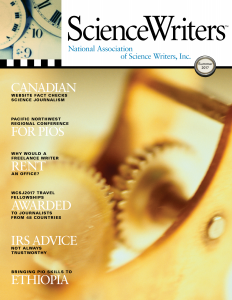By Robin Lloyd
As it did with an equitable health-care system, Canada might have beaten the United States to the punch again. A website dedicated to fact-checking science journalism started a few months ago in Montreal.
More than 100 fact-checking outlets and projects exist worldwide, according to the Duke Reporters' Lab, and the number of such efforts grew by 19 percent since just last year. But most focus on claims made by politicians. The new effort in Montreal, Détecteur de Rumeurs (Rumor Detector), may be the first to concentrate on science journalism, although it also covers reader-submitted questions about science and questions provoked by breaking-news coverage trends rather than by a specific story."The main goal is to offer journalistic fact checking about science information — mostly that which is published in the media and on social networks," says Pascal Lapointe, who heads Détecteur de Rumeurs.
A Feb. 17 post, for example, followed up on stories that labeled President Trump's handshaking style with leaders such as Prime Minister Shinzo Abe of Japan and Justin Trudeau, the Canadian prime minister, as attempted displays of domination.
Rumor Detector questioned those claims, citing more nuanced findings that a firm handshake yields a positive impression and noting that politicians' gestures are mostly performances for photo opportunities. Rumor Detector is technically a section of the nonprofit scientific news agency Agence Science-Presse (ASP), which claims that it's the first science fact-checking site published in French, the official language of Quebec. A crowd-funding campaign got the project off the ground. Support from the province's Quebec Research Fund and a group of universities now finances the salary of a full-time reporter.
Lapointe, the ASP editor in chief, says the project may be unique. "We didn't find any fact-checking sites in science in French or English," he says. "We even made a list last year, when we were trying to find some models — for the style, the text structure, using or not using a 'meter' (true, false, half-true, etc.). Doing so, we rediscovered how dominant politics was in journalistic fact-checking efforts, and how all the rest was essentially around what is 'viral' on social networks. Snopes is very good in that last category, and so, occasionally, they touch on science. FactCheck.org has a 'SciCheck' section which was on and off in 2016, but seemed to publish more often in the last few months, although not regularly."
SciCheck, which received a third year of funding in early February from the Stanton Foundation, does appear to be a cousin of Détecteur de Rumeurs. SciCheck's site states that it checks "false and misleading scientific claims," but stories tend to unmask politicians' whoppers.
Climate Feedback may be the most journalism-centered of all fact-checking projects focused on a scientific topic. The project, funded by the Center for Climate Communication at the University of California, Merced, assesses individual stories about climate science. The evaluations, presented in the form of annotations often by two or more people, are performed by scientists rather than by journalists.
HealthNewsReview, supported for the past two years or so by the Laura and John Arnold Foundation, also has a narrow focus, and goes beyond fact checking. Reviewers from journalism, academia, and medicine evaluate the accuracy of daily health coverage in the news, press releases, marketing, and advertising.
The growing popularity of fact-checking projects and discussions across all topics can be interpreted as a sign of more public interest in evidence, facts, myth busting, and high-quality journalism. But claims of "fake news" and "alternative facts" have complicated matters.
"One problem we're seeing with the political fact-checking sites is that now some people are labeling those as biased," says science journalist Brooke Borel, author of The Chicago Guide to Fact-Checking. So if people "do not like what someone is saying," she adds, "they'll start to question that source as well. It can be this sort of endless loop."
Fact-checking watchdogs can be helpful to a degree, she notes, "but I would like to see journalists do a better job at fact checking their own work."
The reality is that many news publications and broadcasters, especially online media with its precarious business models and tight budgets, may place a low value on fact checking even after an embarrassing or expensive error is revealed. Some outlets employ no dedicated fact checkers; it costs at least an entry-level salary to hire one. But business models for the media are crumbling, and most consumers are unwilling to pay directly for journalism, whether fact-checked or not.
Many journalists receive no training in how to check the facts in their stories. At some media outlets, reporters are not expected to do so, beyond initial reporting. And fact-checking one's own work requires additional time that often goes unacknowledged (and for which freelancers rarely get compensated).
So, caveat emptor — buyer beware. But a gentle reminder that we are all buyers, and quality is not free. Fact-checking sites might help improve consumer confidence.
"Fact-Checking Sites Find Their Way Into Science," Undark, March 9, 2017. Additional Undark science-media posts by Robin Lloyd: "Hard-Sciences Magazine Goes to the Next Level" "Science Paper Rejected? Buy Space in the NYT"
(NASW members can read the rest of the Summer 2017 ScienceWriters by logging into the members area.) Free sample issue. How to join NASW.




